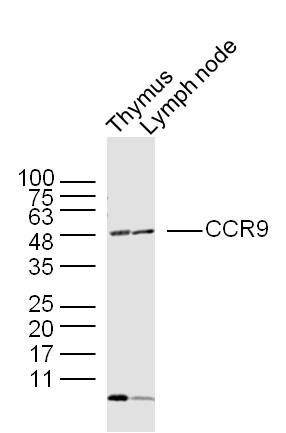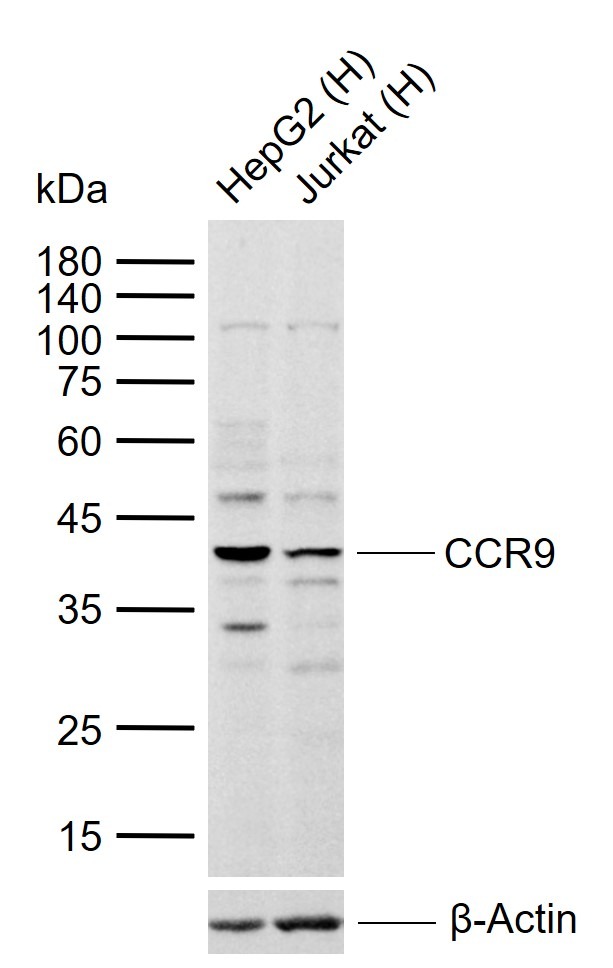Shopping Cart
Remove All Your shopping cart is currently empty
Your shopping cart is currently empty
Anti-CCR9 Polyclonal Antibody is a Rabbit antibody targeting CCR9. Anti-CCR9 Polyclonal Antibody can be used in WB.
| Pack Size | Price | USA Warehouse | Global Warehouse | Quantity |
|---|---|---|---|---|
| 50 μL | $222 | 7-10 days | 7-10 days | |
| 100 μL | $372 | 7-10 days | 7-10 days | |
| 200 μL | $528 | 7-10 days | 7-10 days |
| Description | Anti-CCR9 Polyclonal Antibody is a Rabbit antibody targeting CCR9. Anti-CCR9 Polyclonal Antibody can be used in WB. |
| Ig Type | IgG |
| Reactivity | Human,Mouse (predicted:Rat,Dog,Cow,Horse,Rabbit,Sheep) |
| Verified Activity | 1. Sample: Thymus (Mouse) Lysate at 40 μg LympHnode (Mouse) Lysate at 40 μg Primary: Anti-CCR9 (TMAB-00327) at 1/300 dilution Secondary: IRDye800CW Goat Anti-Rabbit IgG at 1/20000 dilution Predicted band size: 40 kDa Observed band size: 48 kDa 2. Sample: Lane 1: Human HepG2 cell lysates Lane 2: Human Jurkat cell lysates Primary: Anti-CCR9 (TMAB-00327) at 1/1000 dilution Secondary: IRDye800CW Goat Anti-Rabbit IgG at 1/20000 dilution Predicted band size: 40 kDa Observed band size: 40 kDa   |
| Application | |
| Recommended Dose | WB: 1:500-2000 |
| Antibody Type | Polyclonal |
| Host Species | Rabbit |
| Subcellular Localization | Cell membrane; Multi-pass membrane protein. |
| Tissue Specificity | Highly expressed in the thymus and low in lymph nodes and spleen. |
| Construction | Polyclonal Antibody |
| Purification | Protein A purified |
| Appearance | Liquid |
| Formulation | 0.01M TBS (pH7.4) with 1% BSA, 0.02% Proclin300 and 50% Glycerol. |
| Concentration | 1 mg/mL |
| Research Background | The protein encoded by this gene is a member of the beta chemokine receptor family. It is predicted to be a seven transmembrane protein similar to G protein coupled receptors. Chemokines and their receptors are key regulators of the thymocytes migration and maturation in normal and inflammation conditions. This gene is expressed in a range of tissues and hemopoietic cells. The expression of this receptor in lymphatic endothelial cells and overexpression in vascular tumors suggested its function in chemokine-driven recirculation of leukocytes and possible chemokine effects on the development and growth of vascular tumors. This receptor appears to bind the majority of beta-chemokine family members; however, its specific function remains unknown. The specific ligand of this receptor is CCL25. It has been found that this gene is differentially expressed by T lymphocytes of small intestine and colon, suggested a role in the thymocytes recruitment and development that may permit functional specialization of immune responses in different segment of the gastrointestinal tract. This gene is mapped to chromosome 3p21.3, a region that includes a cluster of chemokine receptor genes. Two alternatively spliced transcript variants have been described. |
| Immunogen | KLH conjugated synthetic peptide: human CCR9 |
| Antigen Species | Human |
| Gene Name | CCR9 |
| Gene ID | |
| Protein Name | C-C chemokine receptor type 9 |
| Uniprot ID | |
| Biology Area | Beta Chemokine Rec. (CCR) |
| Molecular Weight | Theoretical: 40 kDa. |
| Stability & Storage | Store at -20°C or -80°C for 12 months. Avoid repeated freeze-thaw cycles. |
| Transport | Shipping with blue ice. |
| Size | Quantity | Unit Price | Amount | Operation |
|---|

Copyright © 2015-2026 TargetMol Chemicals Inc. All Rights Reserved.